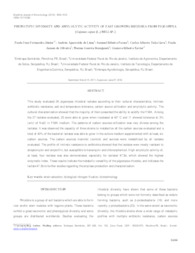Phenotypic diversity and amylolytic activity of fast growing rhizobia from pigeonpea [Cajanus cajan (L.) Millsp.].
Phenotypic diversity and amylolytic activity of fast growing rhizobia from pigeonpea [Cajanus cajan (L.) Millsp.].
Author(s): FERNANDES JUNIOR, P. I.; LIMA, A. A. de; PASSOS, S. R.; GAVA, C. A. T.; OLIVEIRA, P. J. de; RUMJANEK, N. G.; XAVIER, G. R.
Summary: This study evaluated 26 pigeonpea rhizobial isolates according to their cultural characteristics, intrinsic antibiotic resistance, salt and temperature tolerance, carbon source utilization and amylolytic activity. The cultural characterization showed that the majority of them presented the ability to acidify the YMA. Among the 27 isolates evaluated, 25 were able to grow when incubated at 42° C and 11 showed tolerance to 3% (w/v) of NaCl in YMA medium. The patterns of carbon sources utilization was very diverse among the isolates. It was observed the capacity of three strains to metabolize all the carbon sources evaluated and a total of 42% of the bacterial isolates was able to grow in the culture medium supplemented with at least, six carbon sources. The carbon sources mannitol (control) and sucrose were metabilized by all isolates evaluated. The profile of intrinsic resistance to antibiotics showed that the isolates were mostly resistant to streptomycin and ampicillin, but susceptible to kanamycin and chloranphenicol. High amylolytic activity of, at least, four isolates was also demonstrated, especially for isolated 47.3b, which showed the highest enzymatic index. These results indicate the metabolic versatility of the pigeonpea rhizobia, and indicates the isolate 47.3b to further studies regarding the amylase production and characterization
Publication year: 2012
Types of publication: Journal article
Unit: Embrapa Semi-arid Region
Observation
Some of Embrapa's publications are published as ePub files. To read them, use or download one of the following free software options to your computer or mobile device. Android: Google Play Books; IOS: iBooks; Windows and Linux: Calibre.
Access other publications
Access the Agricultural Research Database (BDPA) to consult Embrapa's full library collection and records.
Visit Embrapa Bookstore to purchase books and other publications sold by Embrapa.

